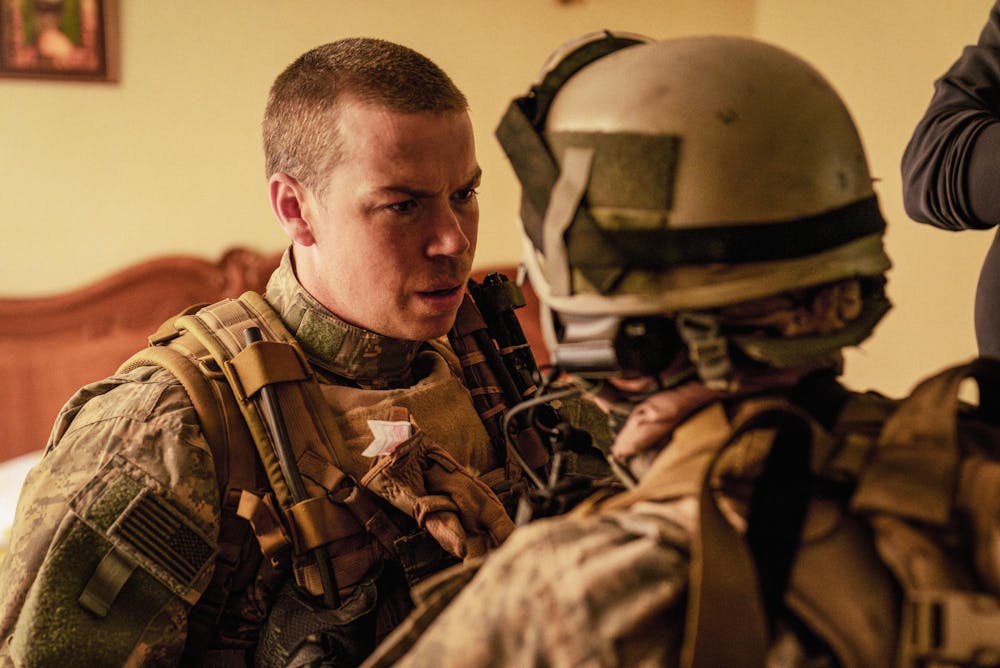François Truffaut, the seminal French New Wave director behind “The 400 Blows,” argued in a 1973 interview with the Chicago Tribune that, “every film about war ends up being pro-war.” He didn’t completely enunciate what he meant by this, leaving the provocative statement up to interpretation.
I’m not sure I agree with this statement as it stands, I do think the anti-war film can exist. I’m more inclined to Francis Ford Coppola’s take on the matter, that he thought anti-war films should be “something filled with love and peace and tranquility and happiness. It shouldn’t have sequences of violence that inspire a lust for violence.”
Alex Garland, co-director, along with Ray Mendoza, of “Warfare,” disagrees entirely. “I would say it’s not possible to show war in any way that resembles what it really is, in terms of its brutality and violence and emptiness, without it being anti-war,” he argued. This is all well and good, it’s a point that stands in legitimate opposition to Coppola’s argument. But even should this be the case, to claim “Warfare” is an anti-war film would be a murky claim at best — a claim that muddles the very meaning of being “anti-war” entirely.
The film, based on Mendoza’s experiences during the Iraq War, positions itself as a realistic portrayal of combat. It’s true that it doesn’t shy away from the horrific realities of wartime violence: there’s sequences that are genuinely difficult to watch, the physical and emotional toll of war being entirely evident. But, at the same time, it’s devoted to the constraints of conventional storytelling: there’s a cadre of soldiers we are persuaded into rooting for, a group of enemy combatants we are necessarily rooting against. Unable, and unwilling, to escape from its Aristotelian structure, “Warfare” inevitably transforms war into an ancient, biblical battle of Good vs. Evil.
At the end of the day, it’s made all the worse that the film has absolutely nothing to say about any of this. It makes no attempt at reconciling its own inherent view of war with its aim to inspire dread. In fact, the project just has little to say about anything at all. Leaving the theater, the single, overwhelming question I was left with was, “Why was this film made?” I understand its purpose — to present, in as realistic a fashion as possible, the actual lived experiences of the people behind its production — but without any sort of message, any sort of successful thematic goal, even this justification falls flat.
It’s a totally apolitical film for an inherently political subject: the Iraq War, with its deceptive justifications that led to the deaths of hundreds of thousands of soldiers and civilians, is still, rightfully, a controversial issue that hardly invites neutrality. To attempt to create a film that ignores these facts, ignores the vital context surrounding the very thing it's representing, is detrimental to achieving any claim of being anti-war because to be anti-war is to resist the political conditions that foment war in the first place. It’s here where, ultimately, “Warfare” totally fails in its moral and social objective.
Lots of attention will certainly be levied at the film’s technical merits: it’s true that “Warfare” displays impressive sound design, cinematography, acting and editing. It is a legitimately harrowing experience; props should be given to that aspect of the picture. But still: what should one make of filmmaking proficiency when the final product is as hollow as this one?
But, maybe more than anything else, when all is said and done, “Warfare” is simply an uninteresting film — precisely because it refuses all efforts to be interesting. I felt similarly about Garland’s previous film, “Civil War,” but at least that film could hide its ridiculousness behind a cloak of fiction and at least had something to say, even if it failed, in the end, to fully enunciate its own view.
In this way, “Warfare” is perhaps closer to a “Call of Duty” campaign than anything else — it’s a film that becomes nothing more than a combat simulator, a commitment to gritty realism that, unintentionally, only serves to reproduce a violent system.






